5 Tips for Living in Amsterdam
Expats and digital nomads find Amsterdam a welcoming city with its relaxed atmosphere and emphasis on work-life balance. The article provides insights into making friends, choosing international schools, learning Dutch, and finding the best neighborhoods.
Expats and digital nomads love living in Amsterdam. "I appreciate the relaxed atmosphere and level of safety compared to where I came from. I appreciate the Dutch appreciation for time off with family and friends. They know when to stop working and enjoy life, people, each other. They also don't consider themselves competitive as we are raised in the US. This has minuses but definite pluses in how they view life and what they feel is important," explained one expat living in Amsterdam. Here are 5 tips for living in Amsterdam:
- Is it Easy to Make Friends in Amsterdam?
- What are the Best international schools in Amsterdam?
- How well do I need to speak Dutch? Do people understand English in Amsterdam?
- What are the Best Neighborhoods in Amsterdam to Live in?
- What Cities and Towns outside of the City do people Commute into Amsterdam from?
1. Is it Easy to Make Friends in Amsterdam?
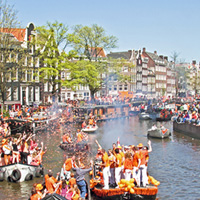 Making friends in Amsterdam takes time. "Don't wait until the honeymoon phase is over to work on making friends and integrating. Learn the language immediately. Show up at 'meet up' groups and social gatherings immediately. Even if you don't 'want' new friends now, you'll need them, and the worst is when you need them and don't have any, and have to start from scratch during a time when you could have had people to call on," advised an expat in Amsterdam. Another expat suggested, "the Dutch circles can be difficult to penetrate. Feeling friendless and an outsider after a warm start was confusing to me and I did feel sad, depressed and confused. I'm an intelligent person and it baffled me why I couldn't figure it out or a way in. Having expats around me - who I at first refused to accept their criticism of the Dutch or Holland - became a big help to me to share experiences and feelings. I wasn't so alone after all."
Making friends in Amsterdam takes time. "Don't wait until the honeymoon phase is over to work on making friends and integrating. Learn the language immediately. Show up at 'meet up' groups and social gatherings immediately. Even if you don't 'want' new friends now, you'll need them, and the worst is when you need them and don't have any, and have to start from scratch during a time when you could have had people to call on," advised an expat in Amsterdam. Another expat suggested, "the Dutch circles can be difficult to penetrate. Feeling friendless and an outsider after a warm start was confusing to me and I did feel sad, depressed and confused. I'm an intelligent person and it baffled me why I couldn't figure it out or a way in. Having expats around me - who I at first refused to accept their criticism of the Dutch or Holland - became a big help to me to share experiences and feelings. I wasn't so alone after all."
2. What are the Best International Schools in Amsterdam?
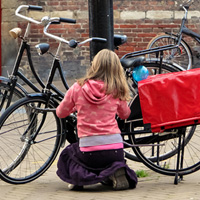 An expat described The British International School of Amsterdam saying, "the School is a 'well oiled' machine for the small years, till year 7. If you like the structured aspect of the British learning program, you will feel very comfortable. The Upper School is a more recent development of the School, which needs further detailed inquiry depending on what you are looking for." The expats' reviews of Amsterdam International Community School are mixed at best. Outside of the city of Amsterdam, there are several other options. The International School of Amsterdam is located in Amstelveen, The International School of Utrecht, The International School of Hilversum, The International Primary School of Hilversum, The American School of the Hague in Wassener, Rotterdam International Secondary School are among the list of schools outside of the city.
An expat described The British International School of Amsterdam saying, "the School is a 'well oiled' machine for the small years, till year 7. If you like the structured aspect of the British learning program, you will feel very comfortable. The Upper School is a more recent development of the School, which needs further detailed inquiry depending on what you are looking for." The expats' reviews of Amsterdam International Community School are mixed at best. Outside of the city of Amsterdam, there are several other options. The International School of Amsterdam is located in Amstelveen, The International School of Utrecht, The International School of Hilversum, The International Primary School of Hilversum, The American School of the Hague in Wassener, Rotterdam International Secondary School are among the list of schools outside of the city.
3. How well do I need to speak Dutch? Do people understand English in Amsterdam?
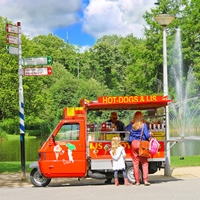 "Be diligent in your language studies. It's not true that 'everyone here speaks English'. Maybe in the larger cities but, even in Amsterdam, I've met people who cannot or won't speak English," advised one expat in Amsterdam. "Right after I first met my husband, I started learning some Dutch words here are there just for fun. There was a desperate scramble to learn all those polite phrases one needs to know as a dinner guest the first time I met his parents. But I didn't really start studying Dutch seriously until I had been here for a little over a month. I started classes at that point and a year later I'm still formally studying Dutch. My husband and I speak Dutch to each other three days a week and I joined an all-women Dutch singing group towards the end of my first year here. I think it's of utmost importance to learn the language of the country you're going to and/or living in, no matter how long you plan to be there," suggested another expat.
"Be diligent in your language studies. It's not true that 'everyone here speaks English'. Maybe in the larger cities but, even in Amsterdam, I've met people who cannot or won't speak English," advised one expat in Amsterdam. "Right after I first met my husband, I started learning some Dutch words here are there just for fun. There was a desperate scramble to learn all those polite phrases one needs to know as a dinner guest the first time I met his parents. But I didn't really start studying Dutch seriously until I had been here for a little over a month. I started classes at that point and a year later I'm still formally studying Dutch. My husband and I speak Dutch to each other three days a week and I joined an all-women Dutch singing group towards the end of my first year here. I think it's of utmost importance to learn the language of the country you're going to and/or living in, no matter how long you plan to be there," suggested another expat.
4. What are the Best Neighborhoods in Amsterdam to Live in?
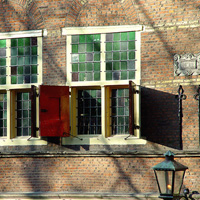 In his article, Where to Live in Amsterdam, Lucas Heckenbucker says, "Amsterdam is undoubtedly an exciting city to live in. This small, atmospheric city has plenty to offer everyone: culture, museums, great food, nightlife, parks and family activities. Amsterdam is officially divided into 15 districts, which are each further subdivided into neighbourhoods. The city's history, tolerance and social housing policies have helped to ensure diversity throughout the city. The majority of expats looking for a 'typically Dutch' urban environment tend to end up in the canal rings encircling the old city centre, the Jordaan, the Old South or the Pijp." His article goes on to describe each of the neighborhoods popular with expats.
In his article, Where to Live in Amsterdam, Lucas Heckenbucker says, "Amsterdam is undoubtedly an exciting city to live in. This small, atmospheric city has plenty to offer everyone: culture, museums, great food, nightlife, parks and family activities. Amsterdam is officially divided into 15 districts, which are each further subdivided into neighbourhoods. The city's history, tolerance and social housing policies have helped to ensure diversity throughout the city. The majority of expats looking for a 'typically Dutch' urban environment tend to end up in the canal rings encircling the old city centre, the Jordaan, the Old South or the Pijp." His article goes on to describe each of the neighborhoods popular with expats.
real estate broker, Barry Burgemeester, offered an overview of the neighborhoods that he feels are the most popular among expats in his article, Popular Neighborhoods in Amsterdam. Barry said, "Oud Zuid is traditionally known as the posh neighborhood of Amsterdam and is one of the most popular areas for expatriates. Many houses are built in the style of the Dutch School and originate from the early 20th Century. Most dwellings are privately owned, well kept and for Dutch standards spacious. In Oud Zuid there is also the Vondelpark. This area is extremely desirable. It offers the best of urban living with a leafier suburban feel. Lots of restaurants, luxury shops and cafes are located in this area. Transport is excellent with the centre just 20 minutes by tram. The area around the Rudolf Hartplein is called Duivelseiland where you can find up market shops, restaurants and pleasant apartments blocks."
5. What Cities and Towns outside of the City do people Commute into Amsterdam from?
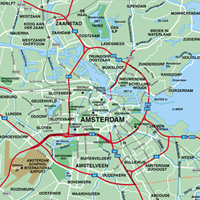 "Amsterdam is part of the Randstad, a quadrangle which include also Utrecht, Rotterdam, and The Hague. This urban network holds most of the population of the Netherlands. While the city has a seemingly small population of 750 000, the area surrounding has a large number of middle sized villages. For many expats to the city, it is these villages rather than the city centre which will serve as their home," wrote Nasser al Kamouchi in his article, Relocating to Amsterdam.
"Amsterdam is part of the Randstad, a quadrangle which include also Utrecht, Rotterdam, and The Hague. This urban network holds most of the population of the Netherlands. While the city has a seemingly small population of 750 000, the area surrounding has a large number of middle sized villages. For many expats to the city, it is these villages rather than the city centre which will serve as their home," wrote Nasser al Kamouchi in his article, Relocating to Amsterdam.
Amstelveen
Amstelveen is a quick 25 minute commute south of Amsterdam. In his article, Barry Burgemeester wrote, "than we also point out to you the green and peaceful suburban town of Amstelveen which is situated immediately south of Amsterdam and has a family sort of feel with an unusual combination of Dutch families, suburban singles, pensioners and business people. This means that there are plenty of restaurants, cafes and sushi bars, as well as a wide range of housing available. Prices for larger houses can rival those of the expensive Wassenaar, located outside of The Hague. It is the favored location for both multi national companies and their employees. Trade and IT are big business in Amstelveen and Schiphol airport has been there since 1917." One expat living in Amstelveen explained, "you live in Amsterdam for the night-life. You live in Amstelveen for the family life. Amstelveen has a great sports club - Special Sports. They have a featured sport every night where people can just show up and play along with the group. This is very well organised and features basketball, badminton, indoor soccer, table tennis, squash. In the summer, tennis and beach volleyball (I didn't believe it either - but they have two courts next to the tennis - and it's popular). Additionally, because of the large expat community (Amstelveen has the largest Japanese community in the Netherlands), there is a very large International school, many Japanese restaurants and a nice amateur Baseball club. Cricket club, too... and even a Rugby club. Amstelveen borders Amsterdam on its southern border - so there are all the expat conveniences there too. Largest shopping mall in the region. Culturally diverse with many Japanese speaking residents, followed by British, Germans and other western Europeans. Economically a wealthy city with considerably higher than average incomes. Negligible unemployment. Extensive city-provided and subsidised facilities. US and Japanese companies abound. Head office of KPMG, Swiss life, Canon Europe and Sony NL are here. Additionally, it's a stone's throw from the National airport, Schiphol, which employs 50,000. The two main Financial districts of Amsterdam, Buitenveldert and Zuidoost, are each roughly 7km (4miles) from the city center - with the head offices of ABN AMRO and ING banks, SNS Bank, the Amsterdam WTC, etc."
Hilversum
Hilversum is a 35 minute car ride into Amsterdam and shorter by train. One expat said, "Nike has their European HQ here, which employs many expats, 2 international primary schools and 1 international secondary school. Easy commute by train 20 minutes intercity to Amsterdam Centraal, 25 minutes intercity to Amsterdam WTC, 20 minutes to Utrecht Central and 20 minutes to Amersfoort. Many large corporate companies within these areas."
Utrecht
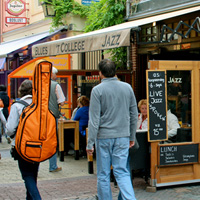 Utrecht is located about 40 minutes southeast of Amsterdam. "Utrecht is mostly a city of University and education. There are several hospitals (Medical Centers) in the area. Holland is not such a big country and therefore many people reside in the Utrecht province, but commute to Amsterdam for work. The IT businesses employ many people here. Join the IWCU, International Womens'Contact Utrecht (English speaking womens'club). The club offers networking with other expatriate women of all ages (married or single) and has social activities for expats, i.e, Mum's & Tots groups, book groups, coffee get togethers, dinners, family activities, monthly general meetings and a bi-monthly newsletter. This club has been most helpful to me to feel less 'alien' in the Netherlands. The club also hosts a dutch practice group to help you get over the language problems (while English is widely spoken in Holland, you still need to be able to read signs, news, directions, menus, etc...). The club is predominately made up of women from the US and the UK, but also includes women from other countries, including the Netherlands. It is a non-profit organization," advised one expat living in Utrecht.
Utrecht is located about 40 minutes southeast of Amsterdam. "Utrecht is mostly a city of University and education. There are several hospitals (Medical Centers) in the area. Holland is not such a big country and therefore many people reside in the Utrecht province, but commute to Amsterdam for work. The IT businesses employ many people here. Join the IWCU, International Womens'Contact Utrecht (English speaking womens'club). The club offers networking with other expatriate women of all ages (married or single) and has social activities for expats, i.e, Mum's & Tots groups, book groups, coffee get togethers, dinners, family activities, monthly general meetings and a bi-monthly newsletter. This club has been most helpful to me to feel less 'alien' in the Netherlands. The club also hosts a dutch practice group to help you get over the language problems (while English is widely spoken in Holland, you still need to be able to read signs, news, directions, menus, etc...). The club is predominately made up of women from the US and the UK, but also includes women from other countries, including the Netherlands. It is a non-profit organization," advised one expat living in Utrecht.
The Hague
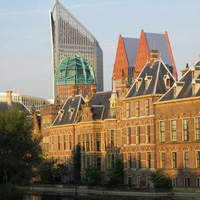 Located about 55 minutes southwest of Amsterdam, The Hague is home to the United Nations, the International Court of Justice, the International Criminal Court and many embassies. One expat said, "I live in The Hague (Den Haag) now and LOVE it! And in fact, Amsterdam really wasn't a town for me. Den Haag has a very large expat community, a lot of art enthusists, really nice museums and endless art shops. It's a little more mature, professional, and less busy than Amsterdam (I think it's probably cheaper to live here as well)." Another expat in The Hague described typical expat housing there, "we rent a 'rijtjeshuie' which is basically a 3-story brick 'town house' on a quiet street in a relatively upscale neighborhood, near a popular shopping street that is a great mix of everyday requirements (good grocery store, hardware stores, drug stores, great specialty stores and also fun boutiques and upscale stuff to window shop). It's fairly typical in this part of Den Haag/The Hague, although probably a bit on the bigger side than some."
Located about 55 minutes southwest of Amsterdam, The Hague is home to the United Nations, the International Court of Justice, the International Criminal Court and many embassies. One expat said, "I live in The Hague (Den Haag) now and LOVE it! And in fact, Amsterdam really wasn't a town for me. Den Haag has a very large expat community, a lot of art enthusists, really nice museums and endless art shops. It's a little more mature, professional, and less busy than Amsterdam (I think it's probably cheaper to live here as well)." Another expat in The Hague described typical expat housing there, "we rent a 'rijtjeshuie' which is basically a 3-story brick 'town house' on a quiet street in a relatively upscale neighborhood, near a popular shopping street that is a great mix of everyday requirements (good grocery store, hardware stores, drug stores, great specialty stores and also fun boutiques and upscale stuff to window shop). It's fairly typical in this part of Den Haag/The Hague, although probably a bit on the bigger side than some."
Rotterdam
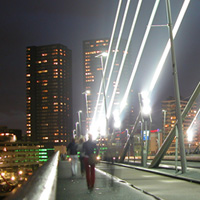 Rotterdam is a little over an hours commute into Amsterdam. "Rotterdam is more of a working class city than Amsterdam. The difference between the cities are very much like Glasgow and Edinburgh, for anyone familiar with Scotland. Rotterdam has one of the largest harbours in the world and therefore has much shipping-related business. Unilever is also located in Rotterdam," described one expat in Rotterdam. Another expat said, "great comments, but by far, Rotterdam is more ethnically diverse than Amsterdam (35-40% ethnically non-Dutch). There are various migrant community social clubs from all parts of the world, religious as well as non-religious. Biggest plus to Rotterdam: great parks and festivals!"
Rotterdam is a little over an hours commute into Amsterdam. "Rotterdam is more of a working class city than Amsterdam. The difference between the cities are very much like Glasgow and Edinburgh, for anyone familiar with Scotland. Rotterdam has one of the largest harbours in the world and therefore has much shipping-related business. Unilever is also located in Rotterdam," described one expat in Rotterdam. Another expat said, "great comments, but by far, Rotterdam is more ethnically diverse than Amsterdam (35-40% ethnically non-Dutch). There are various migrant community social clubs from all parts of the world, religious as well as non-religious. Biggest plus to Rotterdam: great parks and festivals!"
About the Author
 Betsy Burlingame is the Founder and President of Expat Exchange and is one of the Founders of Digital Nomad Exchange. She launched Expat Exchange in 1997 as her Master's thesis project at NYU. Prior to Expat Exchange, Betsy worked at AT&T in International
and Mass Market Marketing. She graduated from Ohio Wesleyan University
with a BA in International Business and German.
Betsy Burlingame is the Founder and President of Expat Exchange and is one of the Founders of Digital Nomad Exchange. She launched Expat Exchange in 1997 as her Master's thesis project at NYU. Prior to Expat Exchange, Betsy worked at AT&T in International
and Mass Market Marketing. She graduated from Ohio Wesleyan University
with a BA in International Business and German.
Some of Betsy's articles include 12 Best Places to Live in Portugal, 7 Best Places to Live in Panama and 12 Things to Know Before Moving to the Dominican Republic. Betsy loves to travel and spend time with her family. Connect with Betsy on LinkedIn.
Additional Information:
- Expat Guide to Amsterdam
- 7 Weekend Getaways for Digital Nomads Living in Amsterdam
- Best Bookstores and Libraries in Amsterdam
- Fun Classes for Expats Living in Amsterdam
- Public Transportation in Amsterdam
- Best Markets in Amsterdam
- Retire in Amsterdam Guide
- 7 Tips for Living in Amsterdam
- Pros & Cons of Living in Amsterdam
- Tips for Expats Driving in Amsterdam
- Cost of Living in Amsterdam
- Health Care in Amsterdam
- Discovering the Best of Amsterdam
- 5 Tips for Living in Amsterdam
- Healthcare & Health Insurance in Netherlands
- Best Places to Live in Netherlands
- Real Estate in Netherlands
- Pros & Cons of Living in Netherlands
- Health Insurance for Expats in The Netherlands
- What It's Like Living in Amsterdam
- Pros and Cons of Living in Netherlands 2025
- 2025 Guide to Moving to Netherlands



